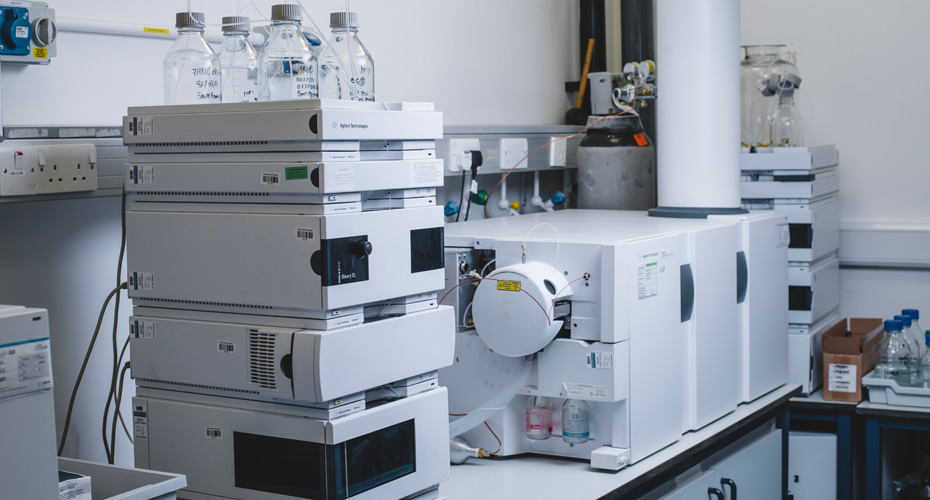Mass Spectrometry Facility
The Mass Spectrometry Facility provides an analytical service for biologically relevant “small” molecules (<1000 daltons) using mass spectrometry and HPLC. We can carry out targeted/quantitative analysis of specific compounds and non-targeted metabolite profiling (metabolomics). Bespoke methods are developed as required.
The Mass Spectrometry Facility is in Biosciences (Biocatalysis Building, Streatham Campus). It houses three mass spectrometers and an HPLC system in a dedicated lab, run by Experimental Officer Dr Dyan Ankrett.
The facility supports researchers across the University and also across the wider community by undertaking external collaboration and contract research.
We carry out data analysis and assist researchers in the interpretation and understanding of the data acquired from our mass spectrometers and HPLC systems. Using these instruments we can analyse most types of biologically relevant compounds (although we currently can not offer a proteomics service).
Equipment
LC mass spectrometers
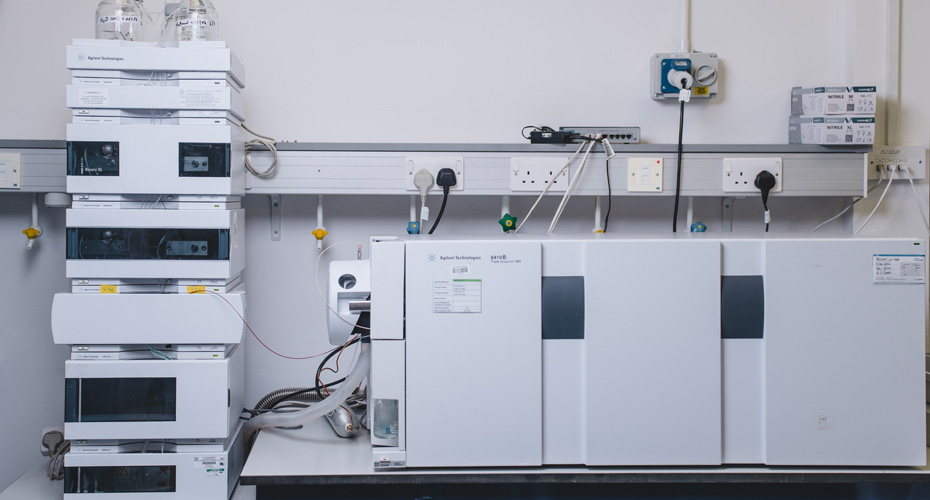
Agilent 6520 accurate mass (2-5 ppm) quadrupole time of flight (QToF) mass spectrometer
Agilent 6410 triple quadrupole (QQQ) mass spectrometer
- Each interfaced to liquid chromatography (LC) via ESI or APCI sources.
- The LC systems comprise Agilent 1200 SL binary pumps capable of rapid high-resolution chromatography to separate analytes before delivery to the MS.
- Various LC column types to separate molecules of varying chemistry.
GC-QToF mass spectrometer
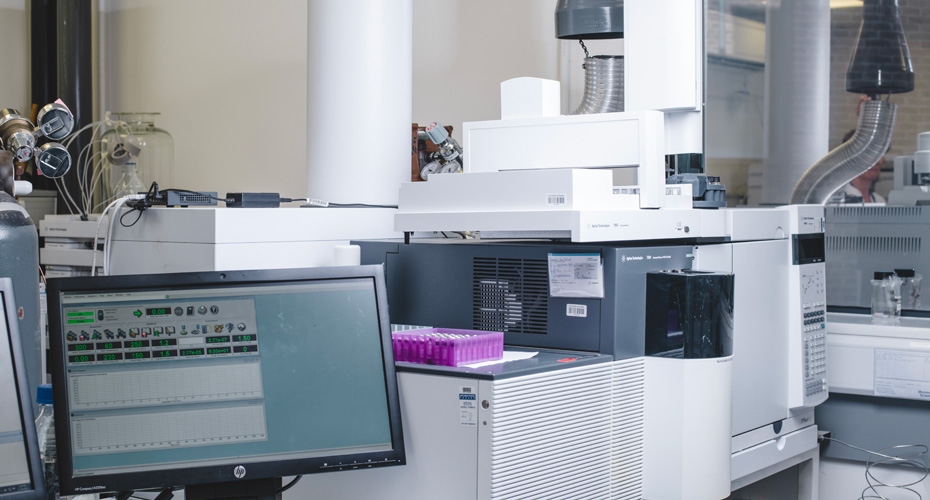
GC-QToF MS/MS with EI and CI sources
- Accurate mass (2-5 ppm) measurement of volatile compounds
- Many non-volatile compounds can be derivatised prior to analysis to make them volatile.
HPLC system
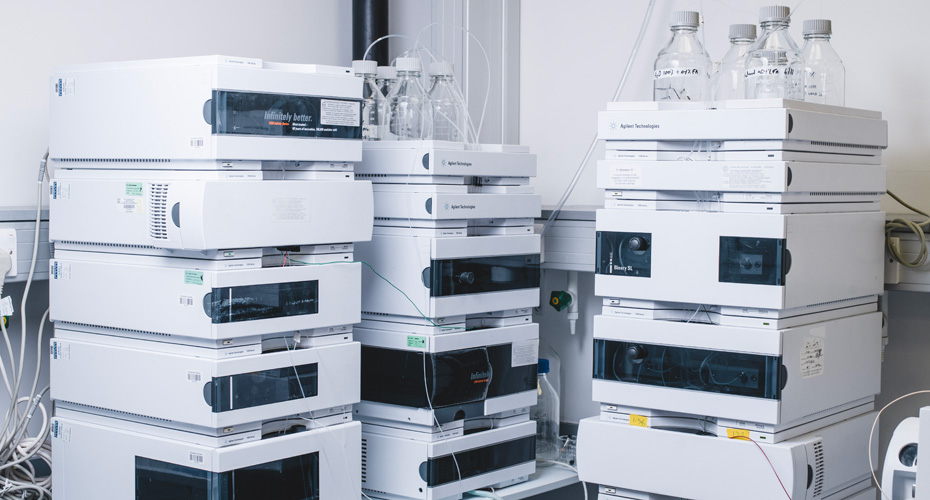
High-performance liquid chromatography (HPLC) system
- Quaternary LC pump
- Photodiode array
- Refractive index
- Fluorescence detectors
- Fraction collector to collect compounds of interest.
Capabilities
Examples of types of research supported are:
Measurement of specific sets of compounds in tissue/cell extracts
Including:
- Sugars
- Amino acids
- Glycolysis/TCA cycle intermediates
- Flavonoids
- Hormones
- Isoprenoids
- Antioxidants
- Specialised/secondary compounds
- Fatty acids
- Lipids
- Drugs
- Organic pollutants
and many others.
Untargeted metabolite profiling (metabolomics)
- To identify differences in chemical composition and relatedness between samples (for example caused by mutations or experimental treatments).
Identification of unknown compounds using accurate mass, isotope abundance and MS/MS fragmentation
- For example: compounds of interest from untargeted profiling and products from enzyme reactions or synthetic chemistry.
- This identification often also requires confirmation by other analytical techniques such as NMR and IR spectroscopy, which complement our mass spectrometry capabilities.
Measurement of metabolic flux or identification of metabolic pathways
- Using stable isotope labelled (e.g. 13C and 15N) precursors.
- Labelling of specific atoms in labelled products is detected by their increased mass.
Data storage
- Data files and metadata are stored on a dedicated server to comply with funder requirements and enable re-use.
Cross-facility capabilities
Mass Spectrometry can work in conjunction with:
- Bioimaging
- Cytomics
- Sequencing
To help provide more comprehensive answers to complex research questions.
Data analysis facilities
MassHunter Qualitative Analysis
Data inspection and general analysis:
- Deconvolve raw data to extract potential compounds
- Extract MS and MS/MS data for compounds
- Predict molecular formula
- Database searches
- Export reports.
MassHunter Quantitative Analysis
- Extract peak areas from samples/standards for quantitative analysis of known and unknown compounds.
- Export spreadsheets.
MassHunter Profinder
- Automated extraction of compounds and correction for retention time drift across multiple raw data files from metabolite profiling experiments.
- Export to spreadsheet or Mass Profiler Professional (MPP) to compare compound abundance across samples.
Mass Profiler Professional (MPP)
- Import compound information from Mass Hunter Profinder for statistical analysis (ANOVA, clustering, PCA etc).
- Database (IDBrowser + PCDL) searching for preliminary compound ID (detailed ID for specific compounds in MassHunter Qualitative Analysis).
- Integration of metabolomic and transcriptomic datasets.
- Accessed via MS facility data analysis computer.
Personal Compound Database and Library Manager (PCDL) for LC-MS
- Bespoke compound lists (plus MS/MS spectra imported from MassHunter Quantitative analysis).
- Searchable from MassHunter Quantitative analysis and MPP for compound identification.
Mass Spectral Librarian for GC-MS
- Very large library of MS/MS spectra searchable via MassHunter Qualitative Analysis.
- Includes the NIST mass spectral library.
- Bespoke libraries can be prepared from our GC-MS data.
Open-source software
- The metabolomics community has developed many online and downloadable data analysis pipelines.
- The MS Facility can advise on the use of a number of these.
Accessing the Mass Spectrometry Facility
Instrument use and charges
If you are interested in undertaking LC-MS analysis, please contact Dr Dyan Ankrett - Experimental Officer for Mass Spectrometry, to discuss your specific needs and we will arrange a quote.
Contact us
We are situated in the Biocatalysis building on the Streatham Campus. Feel free to pop by and chat.
- Dr Dyan Ankrett - Experimental Officer for Mass Spectrometry
- Professor Nick Smirnoff - Director of Mass Spectrometry
Sample preparation
The facility usually requires samples to be delivered ready for analysis but will provide detailed instructions to users on sample preparation.
Careful sample preparation is critical for obtaining high-quality MS data.
A freeze drier, centrifugal evaporator and a manifold for SPE extraction are available.
Meet the team
Prof Nick Smirnoff
Professor of Plant Biochemistry and Director of the Mass Spectrometry Facility
Nick's long-term research interest is in the metabolism and functions of vitamin C (ascorbic acid) in plants. Nick is developing LC-MS and GC-MS metabolite profiling methods and mass spectral databases for plants and algae, and imaging plant chemical composition and metabolism using Raman microscopy.
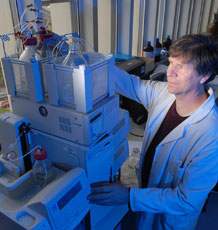
Dr Dyan Ankrett
Experimental Officer for Mass Spectrometry
Dyan has a PhD in the metabolism of small molecules including natural products and synthetic drug molecules. She has previously been awarded funding from Agilent Technologies (one of the major manufacturers of mass spectrometry systems) for combining Agilent’s mass spectrometers with microfluidic technologies for drug metabolism studies.
